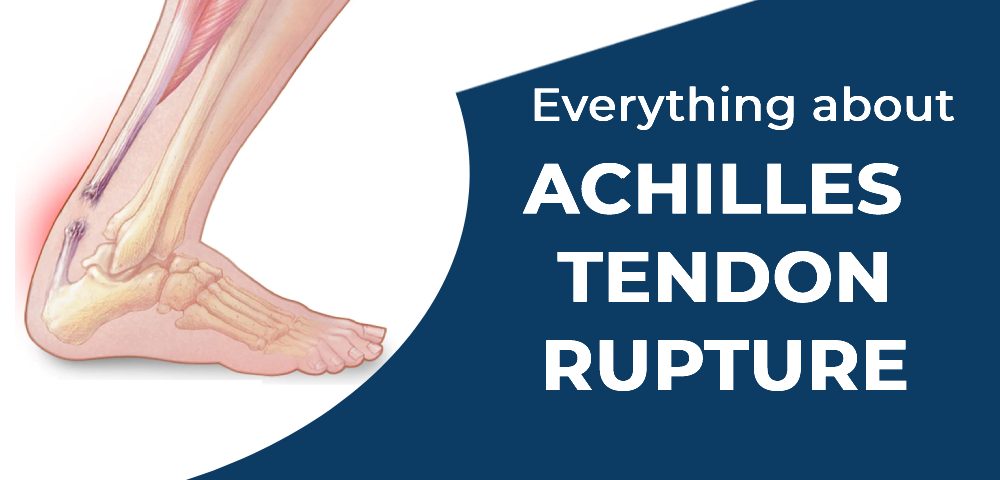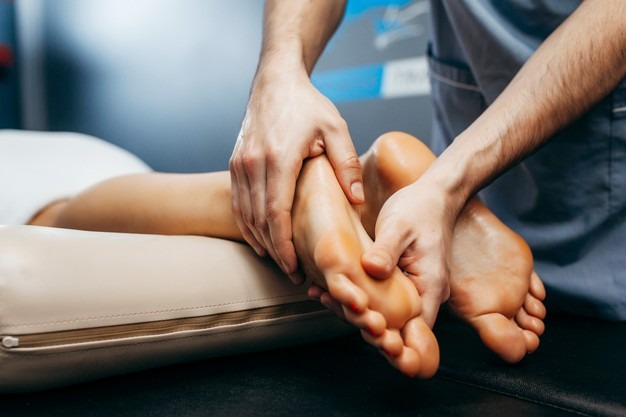- Have any questions?
- +91-9811443717
- [email protected]
Everything about Achilles Tendon Rupture

What is Achilles Tendonitis? How it is treated?
January 28, 2021
Achilles Tendon Disorder- Some health facts
February 10, 2021Everything about Achilles Tendon Rupture

Foot problems can turn everything into a nightmare and one may feel helpless due to the inability to move around like regular days. One such foot problem is Achilles tendon rupture and can lead to sudden pain and difficulty in walking.
How Achilles Tendon rupture occurs?
An Achilles tendon is the most important tendon that runs behind the heel and attaches the calf muscle to the heel bone. Every time you raise your heel while walking or jumping, this tendon supports the movement in the best possible way.
An Achilles tendon rupture develops due to a tear (complete or partial) of this tendon caused due to over-using, overstretching or after an injury. It is quite common for people who don’t indulge in physical activities and suddenly start performing heavy physical training without training their body for it. The bigger problem is that many a times, in view of presence of minimal symptoms, this problem is misdiagnosed as an ankle sprain that leads to neglect and hence subsequent problems.
What are its signs?
- Intense pain in the back of the calf or ankle
- A sudden popping sensation at the back of your heel or ankle
- Inflammation or tenderness on the back region of the leg where this tendon is present
- Unable to walk, jump or raise the toes
- After observing the symptoms, it is important to seek medical advice to prevent further complications and irreparable damage.
How to detect it?
The most important step is the diagnosis of the exact problem and it needs the help of a medical expert. It will help in getting a clear picture of the severity and the treatment procedure that may be the most effective one to treat it. Initially, your foot doctor may ask you about your past injuries and if you have experienced symptoms in your Achilles tendon earlier. Then he may examine your foot to check the range of motion, feel for a step in your Achilles tendon and muscle strength by asking you to stand on your toes or special tests like Thompson test. Usually, patients suffering from Achilles tendon rupture have lesser strength and limited motion. Moreover, you may be asked to undergo a few tests like X-rays, Ultrasound or MRI.
How to treat Achilles tendon rupture?
Achilles tendon rupture can be treated through surgical as well as non-surgical approach and its selection depend on various factors like severity, lifestyle, medical condition, and patient preference etc.
The non-surgical treatment process
If the examination and further investigations at the time of injury reveal a partial rupture, then the problem can be treated non-operatively. Also, this method can be tried in complete ruptures in patients who have a low activity, elderly patients with medical comorbidities and an overall higher risk of surgery. Non-operative treatment mainly involves putting on an initial cast with the ankle in plantarflexed position (toes pointing downwards) to give rest to the tendon. The patient is not allowed to walk on the injured leg. Subsequently, the patient may be given a removal pneumatic walker boot with ankle held in the same position and the patient is allowed to walk and do some exercises of the ankle, under a trained physiotherapist. This method is called as functional rehabilitation and has lead to improved outcomes and lower rupture rates while obviating the need of surgery in few patients. But it needs strict compliance and guidance under a trained and experienced foot and ankle specialist as well as a physiotherapist. Physical therapy is important to regain mobility and muscle strength and is needed for a long period.
Surgical treatment approach
This treatment approach can be helpful to treat complete tear in active patients and is helpful to reduce the probability of re-rupture while enhancing the functionality & push-off strength. There are many surgical techniques through which this problem can be treated and cured. But only an experienced specialist will be able to provide guidance on the exact procedure which can be entitled as the ‘most suitable one’ in your case. It should be noted that there may be some complications attached to your surgery like nerve injury, the problem in the healing of the incision, infection etc. and these should be discussed in detail before going for a surgery. Physical Therapy plays a significant role in the process of post-surgery rehabilitation.
It is crucial to perform a warm-up exercise before every physical training and gradually increase your physical activity to prevent problems in your Achilles tendon. In case, if you are looking for an experienced foot and ankle specialist in Gurgaon, then consult Dr. Anuj Chawla. He has treated many complex foot problems, and hopefully, he will be able to help you.

